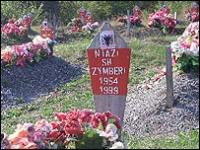







|
News and Information
Scarred Kosovo faces challenges
| October 24, 2005 |

By Matt Prodger
BBC News, Kosovo
Racak cemetery
Killings in Racak have left deep resentment
The United Nations Security Council has given the go-ahead for negotiations to resolve the status of Kosovo.
The province, which legally remains part of Serbia and Montenegro, has been under international administration since a war six years ago which left 10,000 people dead.
Negotiations are expected to last a year and will most likely result in some form of independence, with a continuing role for foreign peacekeepers to prevent further outbreaks of violence between Kosovo's ethnic Albanian majority, and its remaining Serbs.
On a hilltop outside the village of Racak lies a cemetery with a difference.
It is not the Albanian flag fluttering above it in the autumnal sun, nor the flowers wrapped in plastic which adorn each grave. It is the fact that every person buried here is a murder victim.
Six years ago, Serbian police from nearby villages rounded up more than 40 people from Racak and massacred them. For Nato it was the final straw, and soon after, its bombs were ending Serbian rule in Kosovo.
At the local mosque, nearly every worshipper has a relative who died in the massacre. For 68-year-old Ramiz Ymeri, it was his son, his throat cut from ear to ear.
No compromise
He is in no mood today to compromise with Serbs over the future of Kosovo.
"Before we can even talk to Serbia, it first has to accept the independence of Kosovo," he says. "Only then can we start sorting out the past."
Before we can even talk to Serbia, it first has to accept the independence of Kosovo
Ramiz Ymeri
An hour's drive from Racak is another village, Brestovik. This is home to Serb refugees returning to Kosovo after six years in Serbia. Their houses have been rebuilt with aid from the Italian government.
Stana Dzavric has yet to plaster and paint her house, but she says she is overjoyed to be back home. Yet when I ask her how she will feel next year if Kosovo gains independence from Serbia and Montenegro, her face darkens.
"We won't stay here," she says. "We'll pack our bags and leave."
And there is no sign of compromise on a political level. Veton Surroi, a member of the Kosovo Albanian negotiating team says the demand for independence is non-negotiable.
"We are at the final stage of deciding on our independence," he tells me. "This is a mutual project with the Kosovans and the international community.
"The Kosovo Serbs will be involved in this process, no doubt about it, but the question of Belgrade is another issue. Belgrade lost its right to make decisions about this area by committing genocide six years ago."
Challenges
The Serbian government minister for Kosovo Sanda Raskovic-Ivic says: "We've compromised enough by offering the Albanians everything they already have: executive, legislative and judicial powers, plus a president. Under our plan we would retain sovereignty, one seat at the UN as Serbia and Montenegro and we would control the borders."
The most senior figure in Kosovo, the head of the United Nations Mission in Kosovo (Unmik) Soren Jessen-Petersen, says that there is so little common ground between the two sides that getting them to agree would be "an exercise in futility".
Destroyed Serb home
Serbs have returned but fear Kosovan independence
Instead, the "non-negotiables" have been determined by the international community: for example no partition of Kosovo, no union of Kosovo with neighbouring states, no return to the situation before March 1999, and an insistence that Nato peacekeepers remain indefinitely.
High-ranking officials in Unmik are angry about the stance of the Serbian government.
"Belgrade is going to have to concede that Kosovo is a lost cause," one told the BBC. "And we need a strong negotiating partner in Belgrade to do that. But no democratic forces in Belgrade are standing up and saying that today."
Sanda Raskovic-Ivic says Serbs would throw out any government which gives up Kosovo.
"Having Kosovo taken away from Serbia would be very painful and very dangerous," she says. "It's the best way of encouraging nationalists and it's the best way of turning the clock back to the [Milosevic era of] the 1990s."
Within Kosovo another clock is ticking. Graffiti on the streets calls for "self-determination" now, and "no negotiations".
Shadowy groups issue statements warning of dire consequences if independence is not granted. The status quo, as diplomats like to say, is unacceptable. But change also brings its own problems. |
Source: www.bbc.com |
| http://news.bbc.co.uk/1/hi/world/europe/4370798.stm |
|
| Support Caprivi Freedom |
Fill out the form below to become a member of this site and receive our regular newsletter.
|

|

